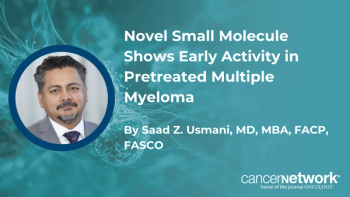
Predicting Carfilzomib-Related Cardiovascular Adverse Events in Myeloma
Researchers conducted a study to define risk factors for cardiovascular adverse events in patients with multiple myeloma who were taking proteasome inhibitors.
Cardiac adverse events occurred commonly among patients with multiple myeloma receiving carfilzomib, with more than half of patients experiencing an event, according to a new study
“The key finding was that natriuretic peptides, including brain natriuretic peptide [BNP] and N-terminal proBNP, are predictive biomarkers for patients at risk for cardiovascular events,” said
Specifically, patients receiving carfilzomib-based therapy with baseline elevated BNP greater than 100 pg/nL or N-terminal proBNP greater than 125 pg/mL had more than 10 times the risk for cardiovascular adverse events (odds ratio [OR], 10.8; P < .001). In addition, elevated natriuretic peptides that occurred mid–first cycle of treatment with carfilzomib were associated with significantly increased risk for cardiovascular adverse events (OR, 36.0; P < .001).
Cornell recommended checking this simple blood test on day 1 and 15 of each chemotherapy cycle for at least the first several cycles of treatment.
The study included 95 patients with relapsed myeloma initiating treatment with proteasome inhibitors carfilzomib (n = 65) or bortezomib (n = 30). The median follow-up was 25 months.
During the study, 64 cardiovascular adverse events occurred; 55% were grade 3 or worse. Significantly more cardiovascular adverse events occurred in patients receiving carfilzomib compared with bortezomib (51% vs 17%; P = .002). The median time to first cardiovascular adverse event was 31 days, and the majority (86%) occurred within the first 3 months.
Cardiovascular adverse events were associated with worse progression-free survival and overall survival, according to the study. Proteasome inhibitor therapy was safely resumed in 89% of patients, with 41% requiring chemotherapy modifications.
“While specific management changes are not recommended based on natriuretic peptides alone, patients with an elevation in BNP or N-terminal proBNP should be monitored closely during their treatment and cardiovascular health optimized,” Cornell said. “Patients with multiple cardiovascular risk factors, particularly those with a history of cardiovascular adverse events and/or elevated baseline natriuretic peptides, should be referred for a comprehensive cardiac evaluation.”
Commenting on the study, Yoshiaki Abe, PhD, of Kameda Medical Center in Japan, called the results important because there are no established predictors for severe cardiovascular adverse events.
“Cornell et al evaluated this crucially important clinical problem using a prospective study design and found that natriuretic peptides were predictive. This finding may harmonize with recent reports from us and others; carfilzomib induces diastolic dysfunction in a mouse model promptly after the drug administration and the presence and severity of baseline left ventricular diastolic dysfunction were associated with the occurrence of severe cardiovascular adverse events in real-world myeloma patients receiving carfilzomib,” Abe said. “The association between the levels of serum natriuretic peptide and diastolic function has been demonstrated in many populations and we recently confirmed this association in myeloma patients.”
Based on this, the results in this study seem reasonable and should be validated in the context of the detailed changes in cardiac function, including diastolic function using much larger cohorts.
“Based on my clinical experiences, I believe that carfilzomib can be used safely even in patients with higher natriuretic peptide levels or other cardiovascular risk factors if they are closely monitored,” Abe told Cancer Network. “I expect these recent reports regarding carfilzomib-associated cardiovascular adverse events will be of help to many clinicians for identifying patients who require such close management.”
Newsletter
Stay up to date on recent advances in the multidisciplinary approach to cancer.



















































